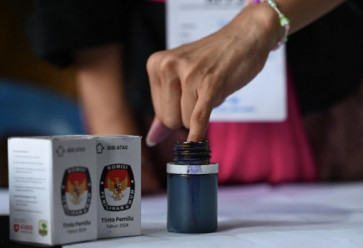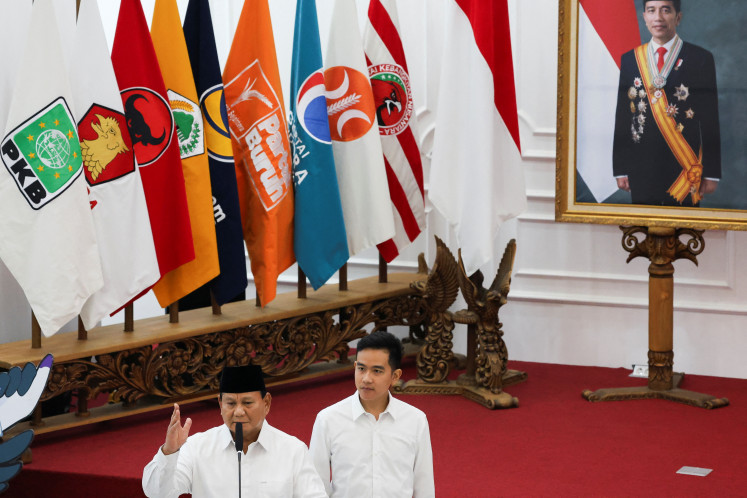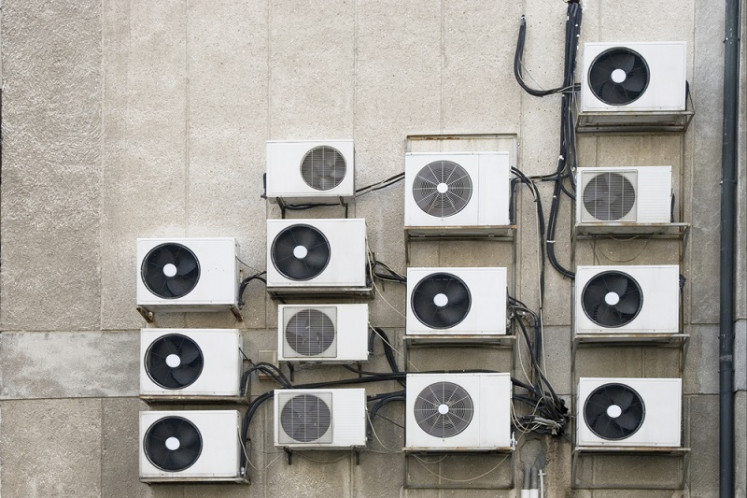How the elderly can stay healthy, active, connected during the COVID-19 pandemic
Passing the time: Mirna Wisnayanti watches television in her room at Sasana Tresna Werdha Ria Pembangunan, an apartment complex for senior citizens who live alone in Cibubur, East Jakarta
Change Size

P
assing the time: Mirna Wisnayanti watches television in her room at Sasana Tresna Werdha Ria Pembangunan, an apartment complex for senior citizens who live alone in Cibubur, East Jakarta. Volunteers can help the elderly residents by picking up their groceries or topping up their phone credit. (JP/Alya Nurbaiti)
Elderly people – those aged 60 and above – especially those with comorbid conditions such as diabetes and high cholesterol, are more at risk from COVID-19, the World Health Organization has warned.
Fear and anxiety over the coronavirus is very real among elderly communities and caregivers.
“Reading the news articles being spread on WhatsApp has caused me to internalize these fearful stories; they even follow me as I go to sleep and appear in scary dreams, such as meeting people who have already died,” 76-year-old Sumirat Soeprobo, a two-time stroke survivor who currently lives with his daughter and son-in-law in Serpong, Banten, told The Jakarta Post via phone recently.
Meanwhile, Liana Carolin, a 36-year-old caregiver who lives in Matraman, East Jakarta, said she was overcome with panic a few weeks ago when her 72-year-old mother, who suffers from vascular dementia, suddenly came down with a persistent cough. Liana’s panic saw her fall prey to a fake online store when she placed an order for 10 boxes of masks.
“I felt guilty because prior to that I had gone out to get my groceries and also exhibited the same symptoms; it is possible for us to only exhibit minor symptoms of the coronavirus yet still be a carrier. Praise be to God, the doctor told me that we were actually experiencing an allergic reaction,” Liana told the Post by video call recently.
Yes, the fear is real, but according to Yuda Turana, a neurologist at Atma Jaya Catholic University’s neuroscience and cognitive center in Jakarta, too much anxiety and fear can actually compromise the immune systems of elderly people, making them more vulnerable to COVID-19 while also increasing their chances of developing mental health problems and experiencing cognitive decline.
Apparently, the best thing we can do is to help them stay healthy, active and socially engaged – albeit virtually – in times like these.
“When discussing news about COVID-19 with them, emphasize the preventive measures they can take,” Yuda advised.
Liana said that she and her family would only watch the news at 4 p.m. to get the latest local statistics on COVID-19.
Sumirat, meanwhile, said he would rather watch martial arts films on cable television to pass the time, and also deleted long threads of messages on COVID-19 in his WhatsApp groups.
“I also consulted my son-in-law, who works as a journalist for the local newspaper Kompas, to distinguish fake news from valid news,” he added.
Meanwhile, Atma Jaya Catholic University medical sociology expert Eunike Sri Tyas Suci said that getting proper nutrition from a diet of vegetables and fruit, regular sunbathing in the morning as well as light physical exercise outside – while maintaining physical distance from others – were helpful.
“Every day before dawn, when the area around my housing complex is still deserted, I go for a 20-minute walk. Every day, I also water my orchids while still participating in daily livestreamed church rituals. I also communicate with my old friends using my smartphone to exchange words of comfort and strength with each other,” said Sumirat.

Eunike said it was vital that extended family members stayed in touch through video conference calls, adding that it was important to accentuate the positive during family conversations to keep one’s elders happy, which would help keep their immune systems strong.
“Encouraging our elders to recall fond memories can also help them gain a sense of meaning and let them feel they have achieved many things in life and been productive. Hopefully, this can sustain their spirits to see through another day,” Eunike explained.
She added that if we participate in a community volunteer initiative to provide food and necessities to those in need, we can also involve our elderly family members by asking them to prepare and package food. She said this would help give them a sense of purpose.
"If we have an elder family member or neighbor who lives alone," Eunike said, "we should make sure to inform them that we will be available anytime they need help."
“Young people can offer help by getting groceries for older people, topping up their phone credit and teaching the less tech-savvy how to use Zoom and WhatsApp video calls,” Yuda advised.
Hopefully, by taking these measures, we can help maintain the physical and mental health of the elderly members of our community in these trying times. By occupying our time with positive activities, without knowing it, the seemingly endless lockdown will eventually come to pass.









